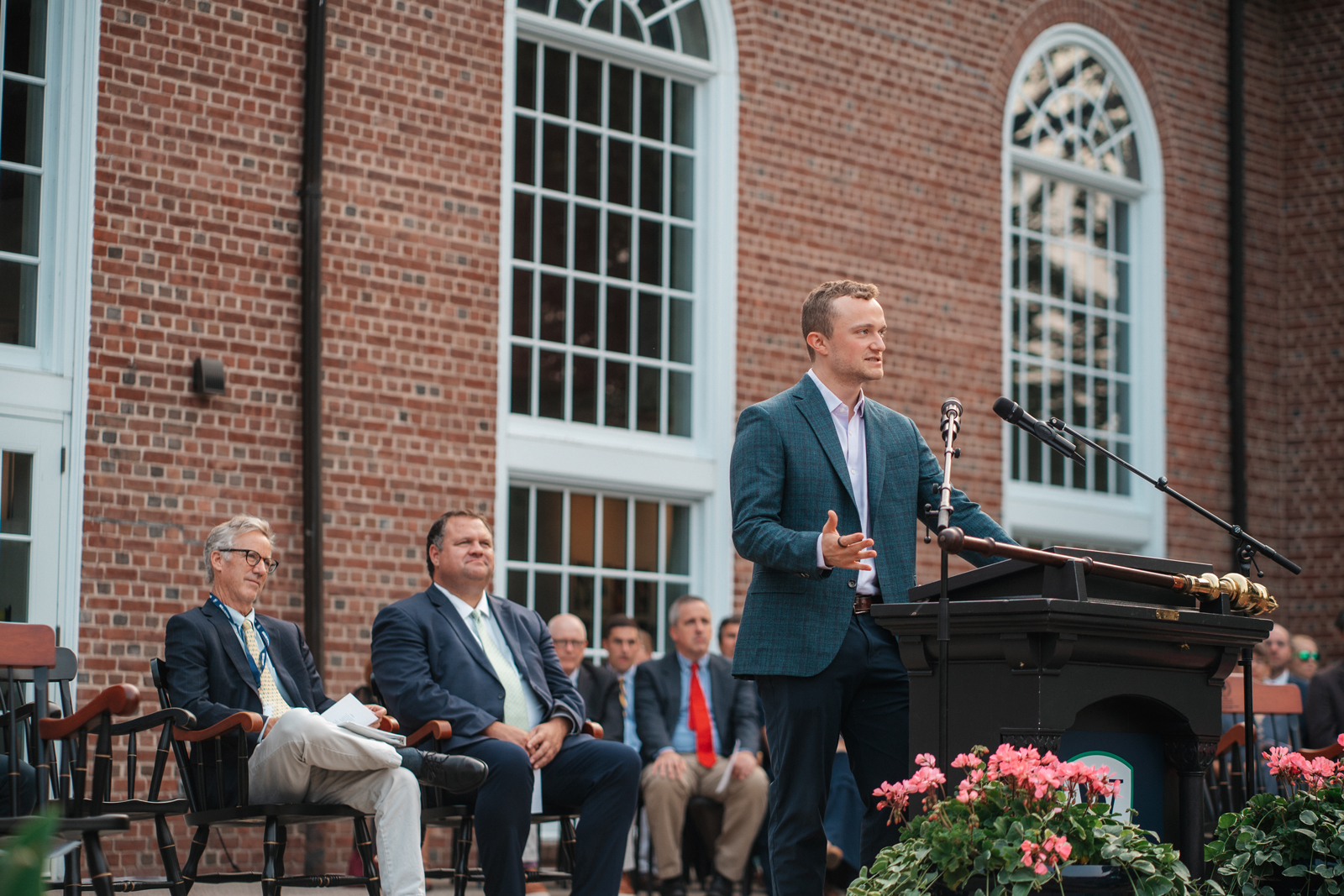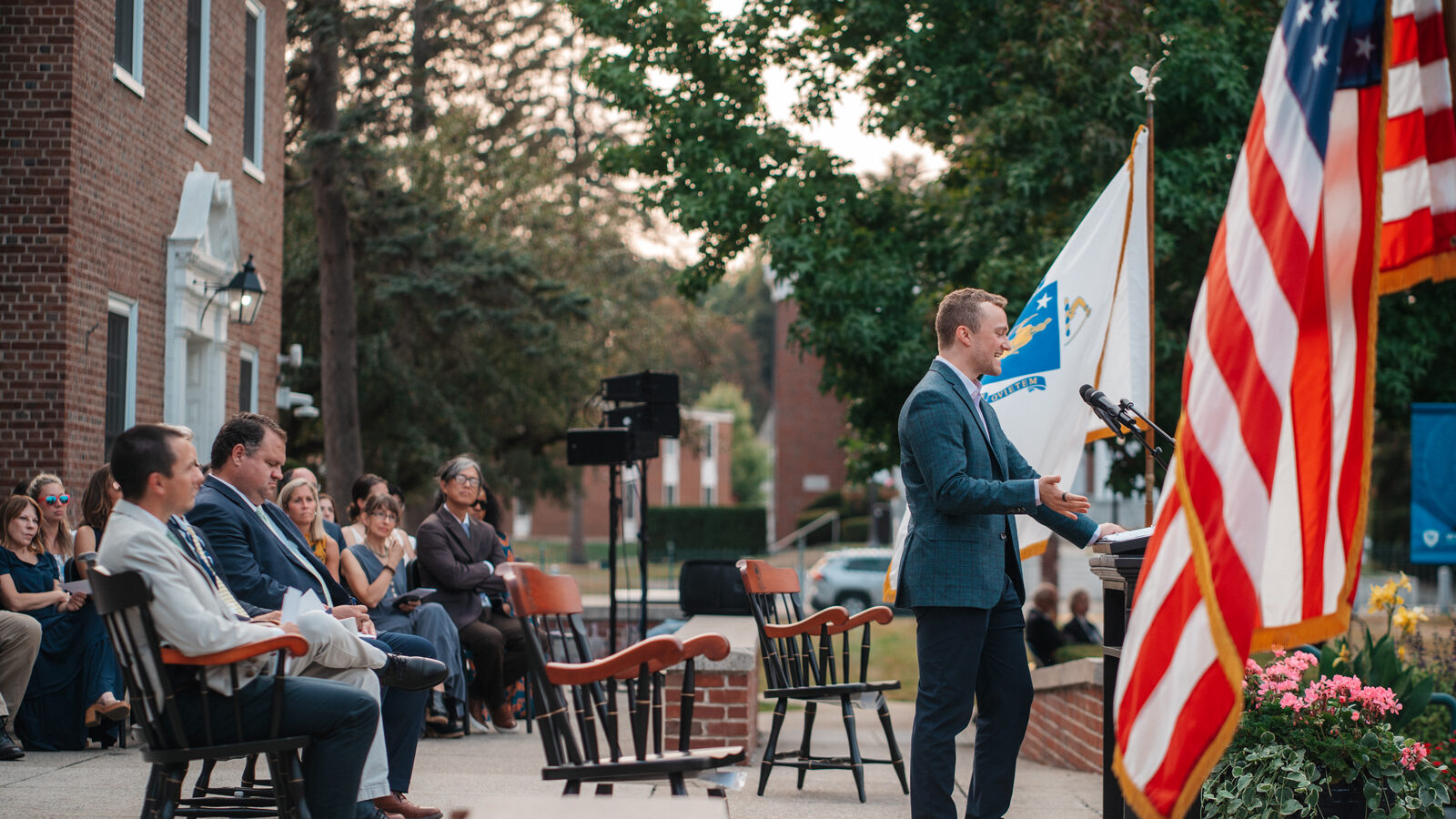Brendan Hellweg ’14 gave the keynote speech during Williston Northampton School’s 185th Convocation ceremony on Friday, September 5, 2025. Hellweg is an entrepreneur and public servant dedicated to modernizing local government and strengthening its capacity to serve communities. He is the co-founder of Holly, a venture-backed govtech startup providing modern infrastructure for government jobs. He was featured in the Spring 2025 edition of the Williston Northampton School Bulletin (read the story here). Below are his remarks from Convocation in full. You can watch the speech on our YouTube page.
 The last time I spoke at this podium, I was asking my classmates to please, please write an article for the Willistonian. I was the editor, and we needed a review of the latest Tandem Coffee menu items and some investigative reporting on what really goes on in Easthampton City Hall.
The last time I spoke at this podium, I was asking my classmates to please, please write an article for the Willistonian. I was the editor, and we needed a review of the latest Tandem Coffee menu items and some investigative reporting on what really goes on in Easthampton City Hall.
Today, I’m here to welcome you into a new year of possibilities at Williston. I hope you’ll savor this moment. I hope you’ll savor this year.
When Mr Hill asked me to be the convocation speaker, I spent a long time thinking about what would be helpful advice for students at Williston. That led me to reflect on my time at Williston: what I learned here, and which lesson has made a real difference for me. Instead of coming up with my own advice, I’ll share what actually made a difference for me.
During my time here, in addition to editing the Willistonian, I ran cross country – slowly – and served as captain of the judo team. I built sets in tech theater and ran lighting for the dance shows. I interned in my hometown mayor’s office in Holyoke for a 22 year-old mayor. But, coming from a family of actors and playwrights, what I really wanted was a big part in the winter play.
I tried out for Motel Kamzoil in Fiddler on the Roof, the elder tailor who defies the arranged marriage expectations to wed Tevye’s daughter Tzeitel, showing what love really means against all obstacles. Instead, I got cast as Mendel, the rabbi’s son, who’s a good match on paper but who has the personality of a brick wall.
I was disappointed. I had auditioned just well enough to have a name instead of Russian Guard Number 3, but I wondered if I had wasted months of rehearsals just to have a handful of lines.
My theater teacher, Emily Ditkovski, gave the advice that helped me through the disappointment and that I’ve carried throughout my career: She told me that there are no small parts. It’s up to you to choose what you’ll make of your time on the stage.
At first, I didn’t believe her, I thought it was a consolation prize for a game I’d lost. But over time, I saw how it played out again and again in my life.
There are no small parts. It’s up to you to choose what you’ll make of your time on the stage.
What does that mean?
First: Small parts are where you learn and become excellent.
After I graduated college, I traveled (moved) to Baltimore for the first time (for a job) and joined the Mayor’s Office. My Mayor would later be arrested by the FBI and IRS for a scandal involving children’s books, but I’ll save that for another speech. Long story short, pay your taxes.
The story I told myself was that I would make a difference through the big moments, when I briefed the Mayor on a vital policy change, or when I asked the perfect gotcha question in a hearing with a Department Head. It felt good to command attention in a suit at a podium. It felt good to tell myself I had a big part.
But month after month, I realized I wasn’t learning anything from these seemingly important meetings. We were going through the motions of bigness, and I had nothing to show for it.
So I changed course. I embraced the small parts. I spent every Wednesday night riding in an ambulance and getting dinner in fire houses so I could listen to emergency medical technicians about the support they needed. I spent afternoons investigating late payments for nonprofits so the city didn’t push them out of business. When the city was hit by a ransomware attack, I embraced the humble work of logging all 214 city services so we could track which had stopped working.
In doing so, I learned the inner workings of government, and I found that I could contribute best when I took the time to listen and learn.
Those small parts are where I learned to be a startup founder, too.
Founding a company is all about listening to the customer to learn what they need.
I listened to Baltimore city government workers about their challenges hiring and retaining their colleagues. I spoke to over 100 local government leaders to listen to their problems building the workforce they need to get the trash picked up and potholes filled. I was the scribe, they were the heroes. I used my Willistonian skills to ask the right questions so they could feel comfortable and share what keeps them up at night.
It turns out, when you talk to a hundred people, carefully noting down the shared problems, there’s a business in there. My time in Baltimore led me to my calling as a founder, and by embracing the small parts and asking the right questions, I learned what I needed to build.
Second: Small parts can make a huge difference. You can be the showstopper.
In Baltimore, I learned how to take the “small part” as a meeting facilitator among the lead players of department heads, so they could come to the right decision with my help.
When Covid struck Baltimore, nobody was prepared for the scale of the challenge. The City leadership needed to make a plan, and the deputy mayor brought me in as a glorified notetaker to facilitate the discussion. I learned that this facilitation enabled its own kind of leadership.
I sat and listened to Jason, Letitia, and Mayor Young, pulling on the threads where they disagreed. I was the youngest person in the room by two decades, but I was the only one without a big part. So I had the ability to take a step back and help them shine. The mayor gave me the assignment to facilitate a proposal between the health department and the economic development office for a Rockefeller Foundation grant.
Those zoom meetings became the Baltimore Health Corps, a program I (had the opportunity to grow) grew to 300 public health workers who formed the core of the pandemic response for the city. We raised $12m in funds from the Rockefeller Foundation, the Baltimore Ravens, the federal government, and others. The White House recognized us as a national model for embedding racial equity in large scale employment development.
I wasn’t hired to lead a three hundred person program. But by taking my small part seriously, I earned the trust to lead a program that became the cornerstone of my early career.
That’s what I learned at Williston: Do your small part, and do it well. You might be surprised at how big an impact you can have.
Third: Small parts are fun, too. They’re an opportunity to support your friends.
You’re part of a bigger team. When you’re not on stage, that’s your time to cheer for your classmates and support your friends. The offstage camaraderie is infectious.
While you’re in the spotlight, I hope you’ll be locked in on being the showstopper, on turning your three lines into the very best version of yourself. And when your lines are finished, I hope you’ll take the time to celebrate your friends and help them be the best versions of themselves.
When you embrace the small part mentality, leading becomes all about helping other people shine. As a founder, it’s my job to help my team be the best versions of themselves. I invest in coaching them, calling out their successes in public, and spotting places where they can grow.
So where does that take us? The small parts are where you learn. The small parts are where you grow. The small parts are where you lead. The small parts are where you serve.
I challenge you to try something you’re not good at yet, but that you want to explore. I challenge you to try something new, and measure yourself only on whether it brings you joy. I challenge you to commit wholeheartedly to your moments on stage and make your lines count, instead of counting your lines.
And in the interests of coming full circle – the Willistonian really needs a review of the latest Tandem Coffee menu items and some investigative reporting on what really goes on in Easthampton City Hall. I hope that someone who’s never tried journalism takes a shot and writes one of those pieces.
Savor this moment, savor this year. Welcome to Williston 2025. Thank you.

